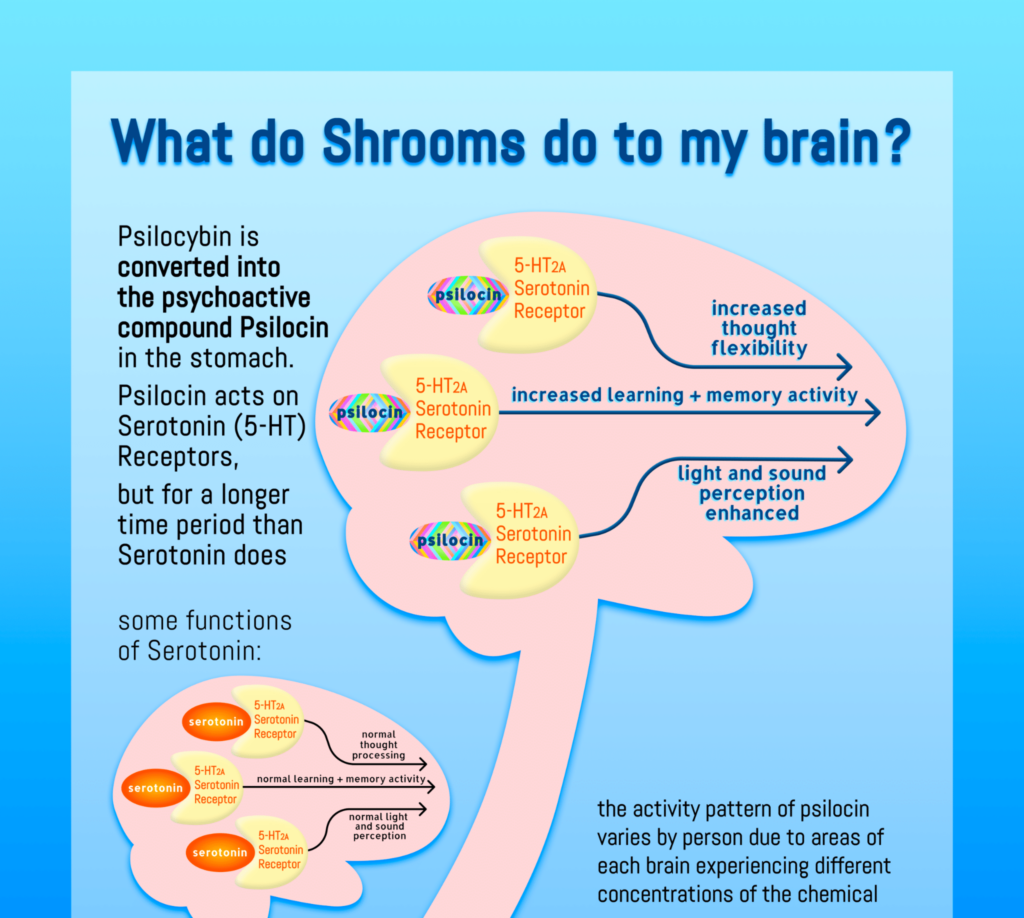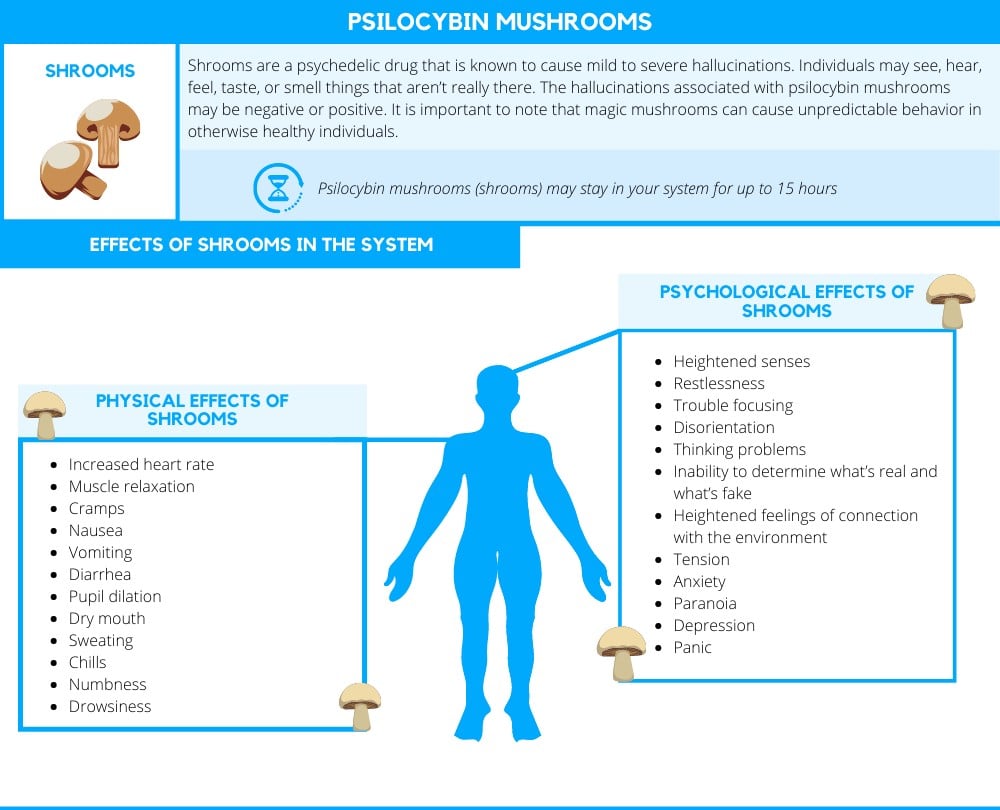Psilocybin mushrooms have been around for thousands of years, but can you get addicted to mushrooms? People used these substances during religious rituals because they used to believe that psilocybin or ‘magic’ mushrooms brought them closer to God. There was a belief that psilocybin mushrooms could help a mortal become immortal and talk to God.
However, magic mushrooms or ‘shrooms’ are popular today because of their hallucinatory and euphoric effects. Contrary to popular belief, magic mushrooms are not safe.
Despite being a naturally occurring substance, using magic mushrooms can make an individual vulnerable to many physical and mental health-related risks. Magic mushrooms come in over 100 species and varieties. All these mushrooms contain psychoactive chemical compounds that can make an individual ‘high’ and experience euphoria and hallucinations.
In this blog, we will explore the answer to the question: ‘Can you get addicted to mushrooms?’ along with other questions like: ‘How can you get addicted to mushrooms?’˘, and the consequences of mushroom addiction in the long and the short run.

There is a high potential for abusing psilocybin mushrooms. Just because mushrooms naturally occur in the environment does not mean they are fit for consumption. Now, one might wonder, despite misusing these substances, can you get addicted to mushrooms? The answer is yes.
About 9.68% of the total adult population of the United States have used psilocybin mushrooms in their lifetime. Magic mushrooms can manipulate the neurotransmitters of the brain, causing them to produce abnormal levels of dopamine, serotonin, and norepinephrine in the brain. This abnormal production of these feel-good hormones can result in an individual getting ‘high.’ With regular use of mushrooms, an individual can become addicted to magic mushrooms as their brain will become dependent on magic mushrooms to produce these hormones.
Since addiction to mushrooms is quite common worldwide, an individual who is addicted to magic mushrooms will typically showcase the following symptoms:
More often than not, substance abuse disorder can open doors to various other mental health disorders. As a result, an individual will have to undergo treatment in a rehabilitation facility to get rid of their mushroom addiction and other mental health disorders that stem from addictions. Moreover, if an individual is addicted to or dependent on mushrooms, they will undergo withdrawal symptoms when they cease the use of mushrooms.
In the next section of this blog, we will discuss how can you get addicted to mushrooms.

It is no secret that psychoactive substances like psilocybin mushrooms can cause dependency. An individual who is dependent on psilocybin mushrooms will also be psychologically dependent on these substances. They will think that they cannot function without these substances in their system.
Even in cases of psychological dependence, an individual can experience nasty withdrawal symptoms. They may be tempted to use this drug just to ease their withdrawal symptoms. In most cases, this gives birth to an addiction to magic mushrooms. Mushroom addiction is one of the most common addictions. Over 32.2 million people are abusing magic mushrooms to get ‘high’ worldwide.
Lastly, individuals who have experienced a traumatic childhood, immense stress, and friction with their loved ones and colleagues may be tempted to use magic mushrooms to ease their anxiety throughout the day. Since mushrooms are easily accessible, many individuals are tempted to use these substances to feel relaxed.
Like any other substance, mushroom addiction can lead to long-term effects on the physical and psychological health of an individual.
An individual who abuses psilocybin mushrooms for a prolonged period starts getting nauseous and hallucinating even without these substances in the system. Since magic mushrooms can hamper the brain’s ability to naturally produce essential hormones like dopamine, norepinephrine, and serotonin, their brain starts functioning abnormally.
The effects of magic mushrooms or shrooms can be much worse when these substances are combined with other intoxicants, such as alcohol. The following are the long-term effects of using psilocybin mushrooms:
Therefore, the answer to the question: ‘Can you get addicted to mushrooms?’ is not only a confirmed yes, but mushroom addiction can cause immense harm to the overall health of an individual.
Now that we have understood the answer to the question: ‘Are mushrooms addictive?’, it is crucial to understand the short-term consequences of this substance as well.
Short-term effects of psilocybin mushrooms can manifest immediately after using magic mushrooms. One might think that the short-term effects of magic mushrooms will not be as dangerous as the long-term effects of mushrooms. However, this is not the case. The short-term effects of magic mushrooms can be fatal as well.
An individual can showcase the following short-term effects after taking psilocybin mushrooms:
Yes, an individual can quickly get addicted to mushrooms as these substances impact the brain’s ability to produce essential hormones like dopamine, serotonin, and norepinephrine.
An individual can experience an increased heart rate, difficulty in breathing, nausea, vomiting, dilated pupils, and blurred vision almost immediately after taking psilocybin mushrooms.
The mushrooms hold immense potential as a natural treatment option for substance abuse and mental health patients. We at Relevance Recovery help our patients with mushroom therapy treatments to cure mental health issues like anxiety, depression, and PTSD.
Psilocybin mushrooms, despite their historical and spiritual allure, pose significant risks of addiction and health complications. Whether used to seek euphoria or escape from life’s pressures, the consequences of using magic mushrooms can be severe, affecting both physical health and mental well-being. Understanding these risks is the first step toward making informed decisions and seeking the right help. If you or someone you know is struggling with mushroom addiction, remember that support and recovery are within reach.